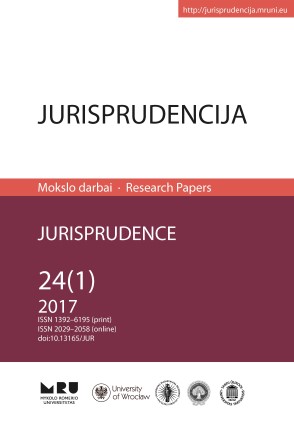EUROPOS SĄJUNGOS PAGRINDINIŲ TEISIŲ CHARTIJA
TEISINGUMO TEISMO JURISPRUDENCIJOJE
EUROPEAN UNION CHARTER OF FUNDAMENTAL RIGHTS IN THE CASE-LAW OF THE COURT OF JUSTICE
Author(s): Egidijus JarašiūnasSubject(s): Human Rights and Humanitarian Law, EU-Legislation
Published by: Mykolas Romeris University
Keywords: EU Charter of Fundamental Rights; case-law of the European Court of Justice; scope of application of the Charter; interaction between the Charter and other systems involved in the protection of fundam
Summary/Abstract: The article analyses the impact of the EU Charter of Fundamental Rights on the development of the case-law of the European Court of Justice after the Lisbon Treaty. The codification of fundamental rights in EU law and the recognition of the Charter as a binding primary EU law of the highest level have determined the beginning of a new stage in the protection of fundamental rights concerning the case law of the European Court of Justice. Before the Lisbon Treaty, the European Court of Justice formed its case-law around the core of the fundamental rights protection system created by the Court itself. The Court used the instrument of general principles of EU law and based the interpretation of fundamental rights on common constitutional traditions and the international instruments’ protection of fundamental rights. Since the Lisbon Treaty, the starting position of the Court of Justice has been defined by the EU Charter of Fundamental Rights. The role of the Court of Justice as the interpreter and the developer of the protection of fundamental rights under EU law is displayed by its case-law, which establishes the status of the Charter as the primary and most important source for the protection of fundamental rights, as well as its autonomy in the interpretation of the Charter. Moreover, the Court’s interpretation also defines the scope of the application of the Charter and its limits and forms the concept of the interaction between the Charter and other systems involved in the protection of fundamental rights (the Charter and constitutional protection, the Charter, and the ECHR or other international instruments). The Charter serves as a legal instrument to ensure the quality of the EU legal system in helping to eliminate secondary EU legislation acts that violate the standards of the protection of the fundamental rights provided for by the Charter. The Court’s case-law takes into account the specificities of the EU legal system (autonomy, primacy, unity and effectiveness). This case-law makes the Charter a living instrument for the protection of fundamental rights under EU law.
Journal: Jurisprudencija
- Issue Year: 24/2017
- Issue No: 1
- Page Range: 6-34
- Page Count: 29
- Language: Lithuanian

